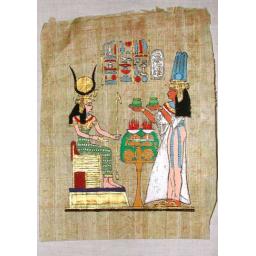

PAPYRUS 6:1 Oh, that the earth would cease from noise, and tumult (uproar) be no more. Earthquakes are often accompanied by loud sounds, subterranean rumbling and roaring, and this acoustic phenomenon gives the name to the upheaval itself.Īpparently the shaking returned again and again, and the country was reduced to ruins, the state went into sudden decline, and life became unbearable. What do “noise” and “years of noise” denote? The translator wrote: “There is clearly some play upon the word hrw (noise) here, the point of which is to us obscure.” Does it mean “earthquake” and “years of earthquake”? In Hebrew the word raash signifies “noise”, “commotion”, as well as “earthquake”. Upper Egypt has become dry (wastes?).ħ:4 The residence is overturned in a minute.Ĥ:2 … Years of noise. PAPYRUS 2:8 Forsooth, the land turns round as does a potter’s wheel.Ģ:11 The towns are destroyed.

The papyrus is a script of lamentations, a description of ruin and horror. It is the Egyptian version of a great catastrophe. The Papyrus Ipuwer is not a collection of proverbs… or riddles no more is it a literary prophecy… or an admonition concerning profound social changes. In accordance with this interpretation, the papyrus containing the words of Ipuwer is called, in the Gardiner edition, Admonitions of an Egyptian Sage. Because the introductory passages of the papyrus, where the author and his listeners would be likely to be mentioned, are missing, the presence of the king listening to the sage is assumed on the basis of the preferred form of certain other literary examples of the Middle Kingdom. “The Almighty”, to whom Ipuwer directs his words, is a customary appellation of great gods. Gardiner… interprets the text as though the words of a sage name Ipuwer were directed to some king, blaming him for inactivity which has brought confusion, insecurity, and suffering to the people. “It is no merely local distrubance that is here described, but a great and overwhelming national disaster.” Invaders preyed upon the defenceless population the rich were stripped of everything and slept in the open, and the poor took their possessions. Egypt was in distress the social system had become disorganized violence filled the land. Gardiner argued that all the internal evidence of the text points to the historical character of the situation.

Gardiner under the title, The Admonitions of an Egyptian Sage from a Hieratic Papyrus in Leiden. In 1909 the text, translated anew, was published by Alan H. Of the first page only a third - the left or last part of eleven lines - is preserved pages 9 to 16 are in veery bad condition - there are but a few lines at the top and bottom of the pages - and of the seventeenth page only the beginning of the first two lines remains. The text of Ipuwer is now bolded into a book of seventeen pages, most of them containing fourteen lines of hieratic signs (a flowing writing used by the scribes, quite different from pictorial hieroglyphics). A facsimile copy of both texts was published by the authorities of the museum together with other Egyptian documents. The face (recto) and the back (verso) are differentiated by the direction of the fiber tissues the story of Ipuwer is written on the face, on the back is a hymn to a deity. In 1828 the papyrus was acquired by the Museum of Leiden or Rijksmuseum van Oudheden in the Netherlands and is listed in the catalogue as Leiden 344. According to its first possessor (Anastasi), it was found in “Memphis”, by which is probably meant the neighborhood of the pyramids of Saqqara.

“It is not known under what circumstances the papyrus containing the words of Ipuwer was found. Excerpt from Ages in Chaos, by Immanuel Velikovsky :


 0 kommentar(er)
0 kommentar(er)
